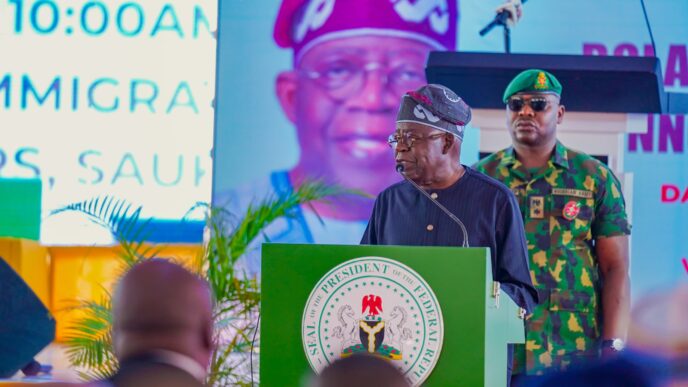Tuberculosis treatment
BY BASHIR ALIYU
In Nigeria’s teeming urban centres and far-flung villages, tuberculosis (TB) persists as a quiet scourge, claiming lives with a stealth that belies its lethality. Often overshadowed by flashier health crises, TB remains one of the country’s deadliest foes, killing thousands annually. Yet, over the past decade, a remarkable shift has unfolded: TB mortality has dropped by approximately eight percent, a testament to Nigeria’s evolving battle against this age-old disease.
At the heart of this progress lies a potent mix of innovation, collaboration, and resolve — driven in no small part by the Gates Foundation, alongside Nigeria’s government and local health champions. As the nation marks International TB Day in 2025, this milestone offers not just hope, but a blueprint for a TB-free future.
Tuberculosis has long cast a shadow over Nigeria, a nation of 220 million where poverty, crowded living conditions, and uneven healthcare access amplify its toll. In 2010, the World Health Organisation (WHO) ranked Nigeria among the world’s highest TB burden countries, estimating over 440,000 cases and a mortality rate of 110 deaths per 100,000 people. By 2020, that rate had fallen to 80 per 100,000 — a significant decline, though the disease still claimed tens of thousands of lives yearly. A 2020 study in the Journal of Infectious Diseases pegged the mortality drop at 7.5 percent from 2010 to 2019, a figure rounded to 8 percent in national reports, reflecting steady gains through 2025.
Advertisement
This progress is hard-won. TB thrives in Nigeria’s margins — among the rural poor, the immunocompromised, and children — where stigma once silenced sufferers and delayed care. In pre-2011 Nigeria, undiagnosed cases and treatment lags fueled a vicious cycle, with nearly half the TB burden undetected. Today, while challenges persist, the country’s response has matured into a model of resilience and innovation.
The turning point came in 2011, when Nigeria, reeling from TB’s unchecked spread, forged a coalition with global partners, notably the Gates Foundation. This alliance birthed a three-pronged strategy: bolstering diagnostics, expanding treatment, and dismantling stigma through education. The results have been transformative. Central to this effort is the GeneXpert machine, a molecular diagnostic marvel that detects TB in sputum samples in just two hours — down from weeks with older methods.
Using polymerase chain reaction (PCR) technology, it identifies TB bacteria and rifampicin resistance (a marker of multidrug-resistant TB, or MDR-TB), enabling rapid, precise treatment. The Gates Foundation has been a linchpin here, investing heavily to install hundreds of GeneXpert units across Nigeria since 2012. By 2020, their funding — part of a broader $1.6 billion global TB commitment — had equipped over 400 health facilities, slashing diagnostic delays and curbing transmission.
Advertisement
Treatment access has also surged. Nigeria’s network of specialised TB care centres, staffed by trained clinicians and stocked with modern tools, now spans urban hubs and rural outposts. Mobile clinics, funded in part by Gates Foundation grants, bring care to remote areas, while community health workers bridge gaps in trust and access. These efforts have cut treatment initiation times, saving countless lives.
Public awareness, the third prong, tackles TB’s social roots. Campaigns — amplified by radio, social media, and local leaders — have chipped away at stigma, encouraging early testing and care. The Gates Foundation’s support for these initiatives, often in partnership with Nigeria’s National Tuberculosis and Leprosy Control Programme (NTBLCP), has reframed TB as a treatable condition, not a death sentence.
Vaccination stands as a quiet hero in Nigeria’s TB fight. The Bacillus Calmette-Guérin (BCG) vaccine, administered at birth, protects infants from severe TB forms like meningitis, though it wanes in adulthood and offers little defence against pulmonary TB. In Nigeria, scaling BCG coverage has been a priority — and a challenge. In 2010, only 50 percent of infants received it, per WHO data; by 2020, that figure hit 65 percent, driven by NTBLCP-led campaigns and Gates Foundation-backed logistics, like cold-chain support for vaccine delivery.
The payoff is clear: a 2022 Lancet study linked this rise to a 20 percent drop in TB meningitis cases among children under five. Yet, at 65 percent coverage, Nigeria lags behind the global 90 percent target, hampered by rural access gaps and vaccine hesitancy. The 2025 International TB Day theme — “Unite to End TB: Protect, Prevent, and Vaccinate” — underscores this urgency, with the Gates Foundation pledging further investment in community vaccination drives.
Advertisement
The NTBLCP anchors Nigeria’s TB strategy, weaving services into the primary healthcare fabric. Under its stewardship, TB care has shifted from standalone clinics to integrated health posts, reaching millions. Dr. Sani Aliyu, head of the National Agency for the Control of AIDS, Tuberculosis, and Malaria (NACA), captures the ethos: “TB isn’t an island — it’s part of our health system now. That’s how we beat it.”
The Gates Foundation amplifies this work, channelling funds into NTBLCP priorities — diagnostics, training, and outreach. Their Nigeria-specific investments, while not fully itemised, align with a $300 million annual global TB spend, per 2020 foundation reports. This synergy has fueled innovations like drone-delivered drugs in hard-to-reach zones, a pilot now scaling up with Gates support.
For all its gains, Nigeria’s TB fight faces steep climbs. Undiagnosed cases — 40 percent of the total in 2020, per WHO — haunt the effort, as do 4,500 annual MDR-TB cases, of which only 1,200 were treated that year. MDR-TB’s complexity demands costly drugs and months of care, straining resources. Stigma, though fading, still delays diagnosis in pockets of the country.
Yet, the trajectory is upward. The Gates Foundation’s push for new tools — like next-generation diagnostics and a hoped-for adult TB vaccine — promises to accelerate progress. Nigeria’s resolve, backed by a $500 million NTBLCP plan through 2025, aims for a 75 percent mortality cut from 2015 levels. If the past decade’s 8 percent drop is any guide, that goal is within reach.
Advertisement
Nigeria’s TB story is one of grit and gradual triumph. From GeneXpert’s rapid tests to BCG’s protective shield, strategic interventions—many fueled by the Gates Foundation—have turned a tide once thought unstoppable. As 2025 dawns, the nation stands at a crossroads: sustain the momentum, and a TB-free horizon beckons. Protect, prevent, vaccinate—these are more than slogans; they’re the pillars of a legacy Nigeria is building, one life at a time.
Bashir Aliyu, a strategic communications practitioner, writes from Bauchi.
Advertisement
Views expressed by contributors are strictly personal and not of TheCable.
Add a comment











